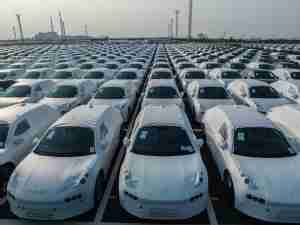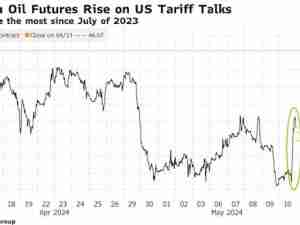Merkel in China Presses for Level Playing Field on Investment
By: Arne Delfs | Jun 12 2016 at 06:00 PM | International Trade
Chancellor Angela Merkel’s mission to drum up more business in China is being overshadowed by angst in Germany about a Chinese company’s 4.6 billion-euro ($5.2 billion) bid for robot maker Kuka AG.
Merkel, on her ninth trip to China in a decade as chancellor, set the tone for cabinet-level talks scheduled Monday by pressing Chinese leaders to ensure “reliable and transparent” rules and a level playing field for foreign investors.
“Chinese investors’ interest in Germany has increased further, which has led to a very lively debate,” Merkel said in a speech at Nanjing University in Beijing after arriving on Sunday. “For our part, we have this reciprocity. Of course Chinese companies will also enter the German market.”
Merkel, accompanied on the trip by 20 chief executives, is avoiding explicit mention of Kuka even as she faces domestic pressure to protect the company, which she views as a model for combining digital technology and German industrial strength. Concern over the deal contrasts with the celebrations of German-Chinese trade ties in previous years as the relationship between the two export-driven economies turns more competitive.
Government officials in Berlin have met Kuka Chief Executive Officer Till Reuter to discuss alternative bids after last month’s offer by Midea Group Co., according to a person familiar with the chancellery’s views on the case. Merkel and Siemens AG CEO Joe Kaeser have discussed Kuka in recent days, according to a second person. Kaeser, who was with Merkel on the trip, told reporters in Beijing that Siemens isn’t interested.
Wakeup Call
“China and Germany are like-minded countries, both focusing very much on manufacturing,” said Hans Kundnani, a fellow at the German Marshall Fund in Berlin. “They’ve increasingly become competitors in similar, high-end production areas.”
The gambit by Midea, China’s biggest maker of home appliances, for Kuka, a supplier of industrial robots, is exposing angst in Berlin about the longer-term intentions of state-backed Chinese investors. While Germany wants to avoid a trade war with China, the episode is a wakeup call that adds weight to Merkel’s demands for China to level the playing field for foreign investors or risk investment restrictions in Europe, according to the person familiar with the matter, who asked not to be identified discussing private talks.
Kuka, based in the Bavarian city of Augsburg, supplies automation equipment to companies such as Airbus Group SE, Volkswagen AG and Fiat Chrysler Automobiles NV. Merkel visited the company’s headquarters last year and toured its robot display at Germany’s Hanover industrial show with President Barack Obama in April.
Kuka and China’s shift to consumer-led economy: Bloomberg Intelligence
Linked by $164 billion in commerce, China is Germany’s fourth-biggest trading partner and Germany is China’s fifth-biggest. Merkel’s three-day trip in Beijing and Shenyang includes a joint cabinet meeting and talks with Chinese President Xi Jinping and Prime Minister Li Keqiang.
As Chinese economic growth flags at home, its companies are more aggressively expanding overseas with government encouragement and an eye toward long-term investment strategies. Midea last week said its offer for the robot maker was in the “best interests” of its employees and shareholders.
‘Normal’ Globalization
While Merkel said she didn’t “directly” raise Kuka during an initial meeting with Li on Sunday, she said she discussed investment matters and a European Union probe into whether Chinese steel exporters are benefiting from market-distorting government aid.
“It’s always about the question of reciprocity of investment conditions,” she told reporters. “We talked about that.”
German business groups say they’re taking the Chinese challenge in stride. The Federation of German Industries, representing about 100,000 companies with 8 million workers, said fears of job and technology losses are often unfounded.
“For distribution in China, entirely new channels open up when a large Chinese company supports its German subsidiary in marketing in China.”said Friedolin Strack, head of the BDI’s international markets department.
“Globalization isn’t a one-way street, it also impacts us at home,” Kaeser said in Beijing. “That’s a completely normal development.”








